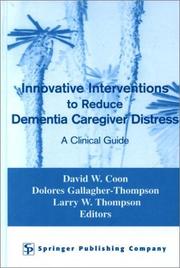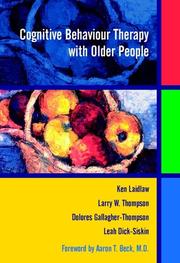| Listing 1 - 6 of 6 |
Sort by
|
Book
ISBN: 0190854227 0199724903 9780199724901 0195383702 9780195383706 0195383699 9780195383690 Year: 2011 Publisher: Oxford Oxford University Press
Abstract | Keywords | Export | Availability | Bookmark
 Loading...
Loading...Choose an application
- Reference Manager
- EndNote
- RefWorks (Direct export to RefWorks)
Depression is a common problem for individuals in their senior years. Conservative estimates suggest that more than five million seniors over 65 are suffering from severe depression. How can you help your older clients manage depressed mood? This Therapist Guide outlines a three-phase program based on the principles of cognitive-behavioral therapy. Designed specifically for use with older adults, this treatment generally is delivered over the course of 16 - 20 sessions. In Phase 1 of the intervention, clients are introduced to the program and are encouraged to develop goals for therapy. The focus of Phase 2 is on helping the client acquire the cognitive and behavioral skills needed to meet the therapy goals. It is during this phase that clients learn the benefits of participating in pleasant activities, how to challenge negative thinking, how to manage feelings of anger and frustration through relaxation, and how to improve communication skills. Phase 3 deals with termination and how to maintain the gains obtained in therapy.
Depressie --- Oudere --- Depression in old age --- Cognitive therapy. --- Treatment. --- Cognitive-behavior therapy --- Cognitive-behavioral therapy --- Cognitive psychotherapy --- Psychotherapy --- Depression in the aged --- Late-life depression --- Depression, Mental --- Geriatric psychiatry

ISBN: 1281116203 9786611116200 0387720073 0387720065 1441924612 Year: 2008 Publisher: New York : Springer,
Abstract | Keywords | Export | Availability | Bookmark
 Loading...
Loading...Choose an application
- Reference Manager
- EndNote
- RefWorks (Direct export to RefWorks)
Handbook of Behavioral and Cognitive Therapies with Older Adults Edited by Dolores Gallagher-Thompson, Ann M. Steffen, and Larry W. Thompson The physical health of older individuals presents many complex issues for providers; equally challenging are the increasingly complicated mental health problems of older adults. Although behavioral and cognitive interventions have been successfully used for a variety of mental and psychological disorders, there is an ongoing need for professional training in applications of these strategies with older individuals. The Handbook of Behavioral and Cognitive Therapies with Older Adults brings together expert scientist practitioners and the full spectrum of cognitive and behavioral interventions to promote age-appropriate best practice. The book enhances the professional’s understanding of the learning and self regulating capacities of older adults. Its consistent and easy-access format features empirical reviews, recommended cognitive and behavioral interventions specific to the problem, instructive case studies, and salient diversity issues. In their choice of topics, the editors have assembled the Handbook to fit the unique challenges of both older individuals and the practitioners working with them. Topics covered include: Common conditions, including depression, anxiety, insomnia, and pain syndromes Severe mental illnesses such as bipolar disorder, schizophrenia, dementia Grief and loss, family caregiving, suicidality Underserved populations, including ethnically and culturally diverse individuals Emerging areas of mental illness management, and effects of Medicare on practice This is important information for use by frontline mental health professionals, including clinical psychologists, geropsychiatrists, gerontological nurses, clinical social workers, occupational therapists, and marriage and family therapists. The Handbook is also suited to graduate and advanced courses in these professions. Reflecting a rapidly developing field, this resource will open up new areas of research and inspire the next wave of treatments tailored to this rapidly expanding population.
Behavior therapy for older people. --- Cognitive therapy. --- Geriatric psychiatry. --- Psychotherapy for older people. --- Depression in old age --- Older people --- Treatment. --- Mental health. --- Behavior therapy for the aged --- Geriatric behavior therapy --- Psychotherapy for older people --- Geriatric psychiatry --- Depression in the aged --- Late-life depression --- Depression, Mental --- Geriatric psychotherapy --- Psychotherapy for the aged --- Gerontopsychiatry --- Geropsychiatry --- Psychiatry, Geriatric --- Psychogeriatrics --- Psychiatry --- Cognitive-behavior therapy --- Cognitive-behavioral therapy --- Cognitive psychotherapy --- Psychotherapy --- Diseases --- Treatment --- Psychiatric care --- Mental health --- Psychology, clinical. --- Behavioral Therapy. --- Geriatrics. --- Aging --- Clinical Psychology. --- Geriatrics/Gerontology. --- Aging. --- Research. --- Clinical psychology. --- Age --- Ageing --- Senescence --- Developmental biology --- Gerontology --- Longevity --- Age factors in disease --- Medicine --- Behavioral therapy --- Behavior modification --- Psychology, Applied --- Psychological tests --- Physiological effect --- Health and hygiene --- Behavioral therapy.

ISBN: 1281813559 9786611813550 0826148026 9780826148025 9781281813558 0826148018 9780826148018 Year: 2003 Publisher: New York, NY Springer Pub. Co.
Abstract | Keywords | Export | Availability | Bookmark
 Loading...
Loading...Choose an application
- Reference Manager
- EndNote
- RefWorks (Direct export to RefWorks)
Increasing evidence has demonstrated that caregivers of dementia victims are at risk for depression and other medical problems. In what ways can health care providers improve or maintain the well-being of dementia caregivers?. This volume provides an overview of emerging themes in dementia caregiving research and presents a broad array of practical strategies for reducing caregiver distress, including interventions for specific populations such as ethnic minority caregivers, male caregivers, and caregivers with diverse sexual orientations. Innovative approaches include the value of partnering
Dementia --- Caregivers --- Care givers --- Carers --- Family caregivers --- Home health caregivers --- Informal caregivers --- Volunteers --- Aphrenia --- Aphronesia --- Athymia --- Dementias --- Brain --- Neurobehavioral disorders --- Psychoses --- Patients --- Care --- Psychological aspects. --- Family relationships. --- Mental health services. --- Mental health. --- Diseases

ISBN: 0471487112 Year: 2003 Publisher: Chichester Wiley
Abstract | Keywords | Export | Availability | Bookmark
 Loading...
Loading...Choose an application
- Reference Manager
- EndNote
- RefWorks (Direct export to RefWorks)
Digital
ISBN: 9780387720074 Year: 2008 Publisher: New York, NY Springer Science+Business Media, LLC
Abstract | Keywords | Export | Availability | Bookmark
 Loading...
Loading...Choose an application
- Reference Manager
- EndNote
- RefWorks (Direct export to RefWorks)
Psychology --- Social psychology --- Sociology of the family. Sociology of sexuality --- Geriatrics --- Psychiatry --- medische psychologie --- geriatrie --- klinische psychologie --- gerontologie --- gender --- persoonlijkheidsleer
Book
ISBN: 9780387720074 Year: 2008 Publisher: New York, NY Springer Science+Business Media, LLC
Abstract | Keywords | Export | Availability | Bookmark
 Loading...
Loading...Choose an application
- Reference Manager
- EndNote
- RefWorks (Direct export to RefWorks)
Handbook of Behavioral and Cognitive Therapies with Older Adults Edited by Dolores Gallagher-Thompson, Ann M. Steffen, and Larry W. Thompson The physical health of older individuals presents many complex issues for providers; equally challenging are the increasingly complicated mental health problems of older adults. Although behavioral and cognitive interventions have been successfully used for a variety of mental and psychological disorders, there is an ongoing need for professional training in applications of these strategies with older individuals. The Handbook of Behavioral and Cognitive Therapies with Older Adults brings together expert scientist practitioners and the full spectrum of cognitive and behavioral interventions to promote age-appropriate best practice. The book enhances the professional's understanding of the learning and self regulating capacities of older adults. Its consistent and easy-access format features empirical reviews, recommended cognitive and behavioral interventions specific to the problem, instructive case studies, and salient diversity issues. In their choice of topics, the editors have assembled the Handbook to fit the unique challenges of both older individuals and the practitioners working with them. Topics covered include: Common conditions, including depression, anxiety, insomnia, and pain syndromes Severe mental illnesses such as bipolar disorder, schizophrenia, dementia Grief and loss, family caregiving, suicidality Underserved populations, including ethnically and culturally diverse individuals Emerging areas of mental illness management, and effects of Medicare on practice This is important information for use by frontline mental health professionals, including clinical psychologists, geropsychiatrists, gerontological nurses, clinical social workers, occupational therapists, and marriage and family therapists. The Handbook is also suited to graduate and advanced courses in these professions. Reflecting a rapidly developing field, this resource will open up new areas of research and inspire the next wave of treatments tailored to this rapidly expanding population.
Psychology --- Social psychology --- Sociology of the family. Sociology of sexuality --- Geriatrics --- Psychiatry --- medische psychologie --- geriatrie --- klinische psychologie --- gerontologie --- gender --- persoonlijkheidsleer
| Listing 1 - 6 of 6 |
Sort by
|

 Search
Search Feedback
Feedback About UniCat
About UniCat  Help
Help News
News